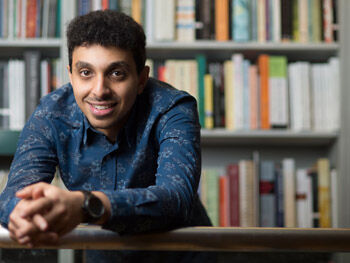University News Last updated 16 March 2017

A University lecturer who discovered new details about Shakespeare and John Milton’s influence in the Middle East and the contribution of Muslim soldiers to World War One, has been named as one of the UK’s most significant new thinkers.
Dr Islam Issa, Lecturer in English Literature at Birmingham City University, has been selected as one of BBC Radio 3 and the Arts and Humanities Research Council’s New Generation Thinkers.
The initiative celebrates talented academics whose work has the potential to make a significant impact on society, and each year selects 10 new researchers whose studies will be made into radio and television programmes for the BBC.
Dr Issa was highlighted as a leading light out of hundreds of applicants following his work examining the social impact of 17th Century poet John Milton’s Paradise Lost.
Dr Issa released his first book last year, Milton in the Arab-Muslim World, which revealed findings suggesting Milton drew inspiration from the Quran and that his writing influenced Middle East political events such as the Syrian Uprising. His study was awarded this year's Outstanding First Book by the Milton Society of America.
He also curated the first exhibition highlighting the contribution of Muslim soldiers in the First World War which revealed that twice as many Muslims fought for the Allies than previously thought, and uncovered personal accounts of the Great War.
Dr Issa said: “I'm thrilled to be named as a New Generation Thinker. It's great that the BBC considers my research relevant to the general public. I'm always keen to make my work accessible and to present it to as diverse an audience as possible".
Applicants were invited to show how their research could be presented to a broad audience and this year’s shortlisted topics cover a wide spectrum of arts and humanities.
Dr Issa’s new research continues to look at how people read literature and focuses on how early modern English literature is read outside the English-speaking world, specifically in the Middle East.
He is also working on a new book on Shakespeare in Arab popular culture and adapting Shakespeare plays to multicultural British.
The final 10 New Generation Thinkers were chosen for their ability to demonstrate a passion to communicate their scholarship to a wider audience.
After a four-month selection process involving a series of day-long workshops at the BBC in Salford and London, the final 10 were chosen by a panel of BBC Radio 3 and BBC Arts producers, and the Arts and Humanities Research Council. They will spend a year being mentored by producers from Radio 3’s Free Thinking Programme.
Robyn Read, Editor of Free Thinking, said: “The New Generation Thinkers have become an essential part of our programme’s quest to nurture new talent in the world of arts and ideas. It’s incredibly stimulating for production teams to work with academics who are so passionate about their research. These ten new voices from our universities have fascinating original work and their hunger to reach new audiences brings something exciting and distinctive to Radio 3 listeners.”
Cassian Harrison, Channel Editor, BBC Four, said: “A core part of BBC4’s brief is to offer a platform for big thinkers with fresh ideas. I’m delighted that Radio3 and the AHRC see the channel as a new complement to what is already an incredibly successful programme."
Professor Andrew Thompson, Chief Executive of the AHRC, said: “This scheme is all about helping the next generation of academics to find new and wider audiences for their research by giving them a platform to share their ideas and allowing them to have the space to challenge our thinking.
"More than ever we need the new insights and knowledge that come from arts and humanities researchers to help us to navigate through the complexities of our globalised world and address the moral and ethical challenges of today and tomorrow.
"The range of subjects covered by the 2017 New Generation Thinkers is really exciting. Their projects speak directly to so many of the debates that dominate the airwaves and national conversations.”